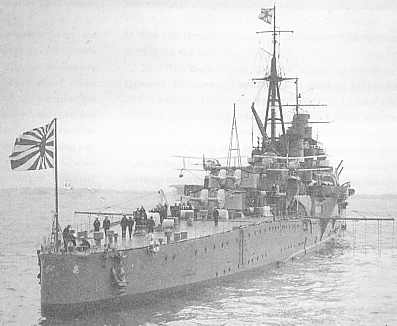- Author
- Ashmore, Edward, Sir, Admiral of the Fleet, RN
- Subjects
- Ship histories and stories
- Tags
-
- RAN Ships
- None noted.
- Publication
- June 2005 edition of the Naval Historical Review (all rights reserved)

I therefore left them there, with my petty officer and an armed rating in charge, and went to find out from the Master what he thought about it all. He was lying on his bunk in his cabin when I came in, and when I explained the position, he rolled over and said ‘Your bloody captain has taken over my ship, you’re now in charge and I’m not going to give you any advice, it’s entirely up to you.’ – Clear, if not helpful!
I went back to the Japanese, who then asked if Birmingham had commandeered the ship, and I told them to go and talk to the captain of Birmingham and ask him. They asked again to see the Master, but I said that I was in charge, and he was not available. They then left. Soon after, a boat came from Birmingham (which was now under way) for me and my party; St Vincent de Paul weighed, and we left harbour together. The Japanese Admiral then made a last attempt at intimidation, and as we sailed at Action Stations with Birmingham between St Vincent de Paul and Ashigara ((The Nachi class heavy cruiser INS Ashigara was eventually sunk in the Banka Strait, off Sumatra, on 8 June 1945 by HM S/M Trenchant, operating from Fremantle and is universally regarded as the most technically perfect submarine attack of WW2. She was a rare and welcome target at the end of WW2 and sank in half an hour after being hit by five of the Trenchant’s torpedoes, making her the largest enemy warship sunk by a British submarine during the entire war.)), her 8in broadside was trained on us. ‘Daddy’ Brind at once trained our 6in guns on the Japanese flagship. Fortunately, no one was stupid enough to go further, and we escorted St Vincent de Paul as far as the entrance to the Yangtze before returning to Wei-Hai-Wei.
Captain Brind kindly showed me a copy of his ‘Report of Proceedings’ to the Commander-in-Chief, in which he had said something quite nice about ‘my officer in charge of the boarding party’, so I was very proud. Brind’s nerve should not be underestimated: the Japanese were at war in China, trigger-happy and unpredictable.




